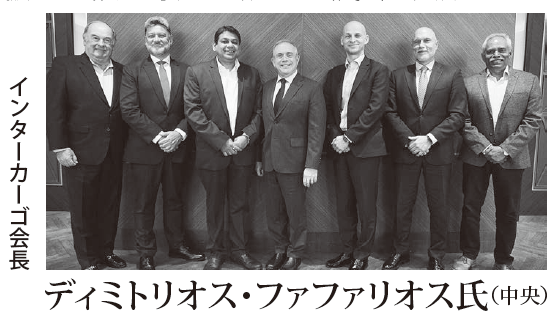“JAPAN MARITIME DAILY interview with INTERCARGO Chairman Dimitris Fafalios & Management Committee during the Association’s recent meetings in Tokyo, Japan”
-Could you tell us the role of INTERCARGO?
INTERCARGO was established in London, UK, in 1980 with the aim of supporting shipowners who own dry bulk vessels. Over the years, environmental regulations have become increasingly important to all of shipping and our focus is on helping our members ensure safety whilst providing a high quality of service.
Dry bulk shipping has a global fleet of 13,000 vessels (of more than 10,000 DWT), making it the largest sector by ship type, but it is known to be less vocal than other sectors. It does not attract the same attention as containerships and tankers.
Currently, around 155 ship owners, managers and operators are members of INTERCARGO. The number of vessels owned by member companies amounts to approximately 3,200 vessels. We are responsible for communicating to the IMO (International Maritime Organization)- and other regulatory authorities – the dry bulk shipping sector’s key challenges and proposed solutions based on the characteristics of our sector.
-What are the characteristics of the dry bulk vessels business?
Dry bulk vessels usually operate on a tramp model, with different routes on each voyage. As they call at ports in different countries and regions, they face different problems than other shipping sectors. We carry more than 1,000 different types of cargoes, each of which must be transported and handled appropriately.
For example, dry bulk vessels have many opportunities to call at ports in developing countries. In some places port facilities do not meet international standards and operations in these ports can be extremely difficult. This places a heavy burden on shipowners, operators and seafarers in charge of cargo handling.
INTERCARGO has consolidated the challenges faced by owners, operators and seafarers of dry bulk vessels and is appealing to regulators such as the IMO for solutions. By making regulators understand the importance of the issues and encouraging them to take action, we aim to ensure safe, high-quality transport of cargo on dry bulk vessels.
– INTERCARGO is committed to improving safety of navigation.
When I started my career in the shipping industry, – said INTERCARGO Chairman Dimitris Fafalios- many dry bulk vessels had safety issues. Many vessels were lost at sea and many seafarers lost their lives. Safety problems became even more serious in the 1990s.
INTERCARGO, in cooperation with the IMO and other international shipping organizations such as the International Association of Classification Societies (IACS), the International Chamber of Shipping (ICS) and INTERTANKO, has been involved in developing safety standards for ship construction and operations. These efforts have been successful and the number of accidents is on a downward trend.
-The DryBMS, a new quality management standard for dry bulk vessels, has now been launched in co-operation with Rightship.
DryBMS is a system for shipowners and ship management companies to self-assess the safety and performance of their vessels, and is managed by an independent organisation called the Dry Bulk Centre of Excellence (DBCE). The aim is to improve the quality of safety and other aspects of the industry as a whole.
A unique aspect of the DryBMS is that shipowners and charterers have jointly developed assessment criteria for vessel quality and performance. The evaluation items are divided into 13 categories, covering people, performance, plant, and processes. The DBCE will establish an independent audit system to assess and verify the self-assessment of shipowners and ship management companies. It is very important that representatives of shipowners will have a place on the Board of DBCE so to ensure that their interests are heard at all times.
– Are there any initiatives you have been focusing on recently?
We are working on the issue of the IMO’s CII regulations, which rate existing ships on a five-point scale based on their operational green house gas emissions, in effect their fuel consumption performance over a one-year period and require low-rated ships to submit annually a proposed improvement plan, and have it approved by the flag authority.
INTERCARGO is fully aware that the CII system is not an effective way of assessing a ship’s environmental impact. For example because of the Houthi attacks in the Red Sea, even though many vessels avoid the Suez Canal and sail longer voyages, their CII has improved. The best solution is being sought for shipowners operating ships in the tramp model.
In relation to the environmental issues, dual-fuel vessels, where alternative fuels with a lower environmental impact can be used, are not always the right solution for all charterers, because of the high cost and limited availability.
Flexible solutions are needed to decarbonize. Biofuels and carbon capture technologies may also be practical solutions if supply and networks are developed. It is undesirable for the world economy if the flexibility of the tramp model is compromised for ineffective environmental compliance.
-A semi-annual meeting was held in Tokyo in May 2024.
Japan is a very important country for the dry bulk shipping industry. It is a major importer of various types of dry cargo and has many shipyards building high-quality dry bulk vessels. It is home to many shipowners, operators, shipbuilders, marine equipment manufacturers, trading houses, brokers, financiers and other stakeholders.
INTERCARGO is honoured to have Japanese shipowners among its 150+ full members and we would very much welcome more Japanese owners and operators to join our association. More members will enable the dry bulk shipping sector to be heard in decision-making at the IMO and elsewhere.
For example, it can help us communicate to regulators that small and mid-sized bulkers such as Handymax, Supramax and Ultramax ships require different solutions than Capesize bulkers, tankers and LNG vessels in relation to environmental regulations.
For many of our member companies, Japan is a second home. We have built our ships in Japan and have done business with Japanese shipowners, charterers and banks. Member companies have faced a number of common problems in recent years, such as the pandemic, the Ukrainian crisis and the Red Sea issue. A common voice is needed to address these issues. The aim is to work with Japanese shipowners to develop the industry as a whole.
You may find the original article in Japanese below.



